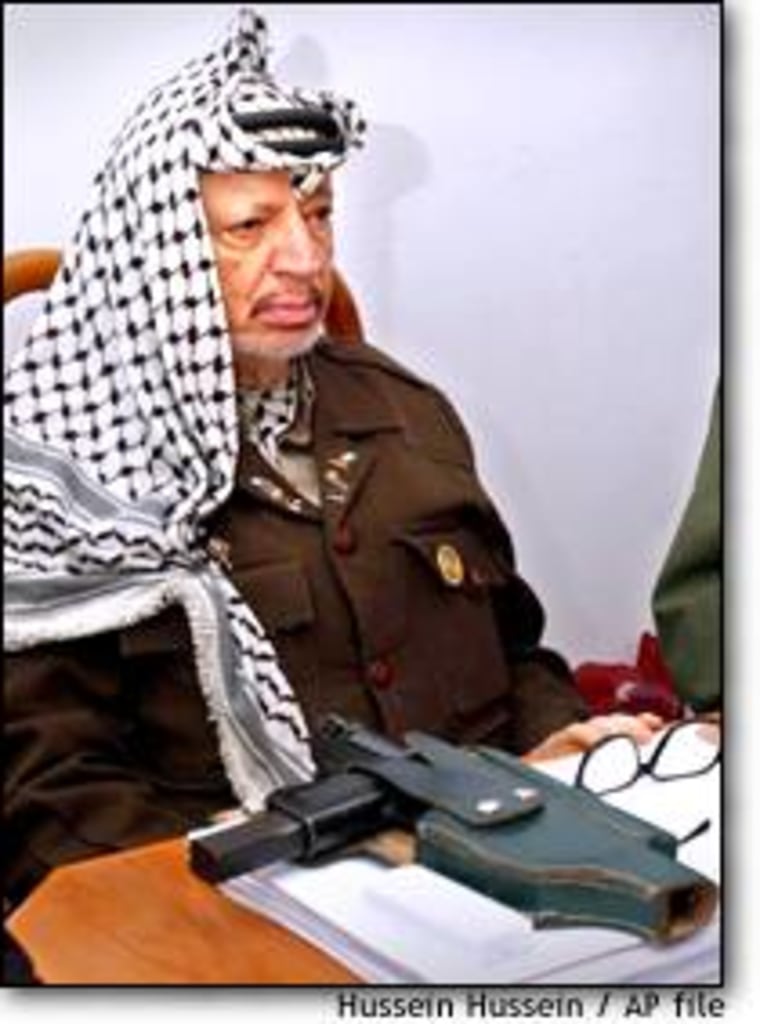History teaches us that the leaders of national liberation movements do themselves and their people a great favor by stepping down once the time for bloodshed is over. Yasser Arafat long ago demonstrated that he has no grasp of history, and those unfortunate enough to call him their “leader,” as well as those who offered him their hand in peace, have suffered grievously as a result. But by waiting out Israel’s “quarantine” in Ramallah and the invasion of his stillborn state, the Palestinian leader has proven that his own hide matters above all else.
LEADERSHIP DEMANDS personal commitment and a willingness to make the ultimate sacrifice. For all the cynicism that is heaped upon those who seek and wield power, it should never be forgotten that the greatest leaders of our time often end up dying for what they believe in. Even those whose own early struggles might be viewed in retrospect as bloodthirsty or treasonous - Egypt’s Anwar Sadat, the Irish rebel Michael Collins, Israel’s Yitzhak Rabin come to mind.
Yasser Arafat won his freedom from Israeli captivity this week after being confined at gunpoint to his Ramallah compound for more than five months. He achieved this by accepting a deal he could have cut with the Israelis five months ago if his main concern had been the lives of those he claims to lead. He proclaimed “I will be a martyr!” Would that it were so.

The deal, brokered by the United States, calls for him to turn over to U.S. and British authorities the suspected assassins of an Israeli cabinet minister and others who arranged a shipment of arms from Iran that Israeli gunboats intercepted late least year. Having agreed to those terms, Arafat is now free to roam the shattered remnants of his realm.
SPREADING THE BLAME
Many in the world would like to blame the Palestinians’ plight solely on Israel. That is clearly wrong. Certainly, the the disastrous course set for Israel by its current leadership hastened the two nations’ descent into hell. Since coming to office, Ariel Sharon made no genuine effort to restart peace talks, even before suicide bombs became a daily occurrence. Sharon is carving his name into the history books with a bayonet, and like other hard-liners before him - Likudniks Menachem Begin, Yitzhak Shamir and the countless dictators of the Arab world - history will repay him by shining a harsh light on his actions.

No matter what brutalities Sharon’s troops inflicted on the West Bank over the past month, the fact remains that Israel desperately needs to come to an accommodation with the Arab world and especially with those Arabs who still cling to 50-year-old property deeds that “prove” they own land in Haifa, Jaffa and Jerusalem. If Israel fails to do this, physics and human nature dictate that someday soon a weapon of mass destruction will render the issue moot. That, and not the survival of the odd settlement or the construction of a fence around the West Bank, is Israel’s real issue of national survival.
CREDIT WHERE IT’S DUE
But Israel’s mistakes and excesses do not excuse the leadership vacuum and outright criminality that has characterized Arafat’s government, particularly since the collapse of peace talks in early 2000. Yes, Israel continually flouted its promises with regard to territorial concessions, beginning with the very map that came out of the Oslo peace accords. But Arafat has matched that duplicities lie for lie, ballooning the number of men under arms to triple or more the level called for in the “Interim Accords” that governed the peace process; manipulating and inflaming radical tendencies when it suited his political needs; releasing known terrorists from prisons as a pressure tactic; denouncing terrorism in English and praising it in Arabic, and most seriously, allowing his own Tanzim militia to become intimately involved in the recruitment and planning of attacks by suicide bombers.
In effect, Arafat - a man who spent much of the 1990s posing as a successful revolutionary, has become instead the best excuse Sharon and other peace opponents in Israel could possibly imagine for not negotiating.
WHAT MIGHT HAVE BEEN
It boggles the mind, and pains the heart, to think of the opportunities this selfish man has passed up. At the top of the list is his refusal to accept a ground-breaking offer for control of almost all of the West Bank and Gaza, plus a chunk of East Jerusalem, by the Labor Prime Minister Ehud Barak. The offer, put forth first at Camp David in the summer of 1999 and later at Taba just before Barak left office, failed primarily because it did not deal sufficiently with the issue of Palestinian refugees living outside the occupied territories. Arafat feared, probably with good reason, that a deal signed that excluded a “right of return” for the millions still in refugee camps in Lebanon and scattered throughout the world might lead to his assassination.
Principle: “They are my people, too,” gave him the out he needed. But it also marked Arafat as a failed leader.
These are precisely the kinds of compromises that the greatest leaders are forced to make. Michael Collins of the 1920’s Irish Republican Army agreed to give up the six northern provinces of Ireland in return for an independent south. He was murdered by his own dissidents in the civil war that followed.
Similarly, zealots murdered Rabin for giving up “Judea and Samaria,” as the Israeli right likes to call the West Bank. Perhaps most unfair of all, Sadat was murdered by zealots of another stripe for signing a peace that actually got Egypt back the Sinai Peninsula.
WHAT STILL CAN BE
Opportunities for Arafat to correct the perception that power is his main concern have come and gone. As the violence flared in September 2000, he could easily have imposed order. He chose to ride the wave, and it came crashing down, as usual, on his own people.
Even during his “captivity” in Ramallah, he had the opportunity to call Israel’s bluff by taking a firm, unequivocal stand against the suicide bombers. When he did finally, reluctantly denounce them in Arabic, he did so only because his own personal situation had become untenable. Imagine if Arafat, instead, had defied Israel’s quarrantine and walked unarmed toward their lines. Imagine if he had called upon his legions to do the same. He might well have died, and he may have ended up in exile. But, to quote another great leader who died for his cause, Mohandas K. Gandhi, “We must become the change we want to see in the world.”
It is time for Arafat to step aside. Arafat rightly refused to let Israel choose the leaders they wanted to deal with from among the Palestinians. That truly would be a betrayal. But now that he is “free” again, he should choose one himself. He is a spent force in a steep decline, and the only place he can lead his people is down with him.
Mail your thoughts to Michael Moran, request to join (or be removed from) his email notification list.
